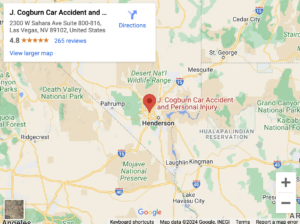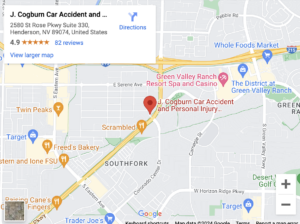
In a Nevada personal injury case, plaintiffs can seek different types of damages for their injuries. Normally, these include economic and non-economic damages. In some cases, a plaintiff can be entitled to punitive damages, also known as exemplary damages, in Nevada. To obtain punitive damages, the plaintiff must show the defendant’s conduct was especially egregious.
Unlike damages to cover losses such as medical bills, pain and suffering, and lost wages, punitive damages exist to punish the other party for their actions. Because punitive damages are more difficult to prove, it helps to have an experienced personal injury attorney to guide you.
What Are Punitive Damages?

In most personal injury claims, an accident victim can receive economic damages. These damages cover quantifiable losses such as medical bills, lost income, property damage, and more. Victims can also recover non-economic damages for intangible costs such as pain and suffering, loss of companionship, disability, disfigurement, and other damages tied to their trauma.
Punitive damages, on the other hand, may be awarded only in rare circumstances. In these cases, the court aims to punish a defendant for their behavior. Punitive damages go beyond compensating the plaintiff and have a broader public interest goal. In punishing the defendant financially, a punitive damage award sends a message to society about the behavior involved.
Nevada’s Law on Punitive Damages
Under Nevada law, a plaintiff must show at least one of the following to be eligible for punitive damages:
- Oppression. This involves conduct that intentionally causes unjust or cruel hardship to the victim. The defendant must also act with conscious disregard for the rights of the victim. For example, if a person intentionally collides with another driver or creates a hazardous situation intended to hurt someone, their conduct could fall within this category.
- Fraud. This involves intentional deceit, misrepresentation, or concealment of facts in order to intentionally harm the victim or deprive them of their property or rights. A simple mistake is not enough – there must have been some active effort to deceive the other person.
- Malice. Malice is conscious, intentional conduct that seeks to cause harm to another, with hatred, flagrant indifference, and total disregard for the well-being of the other person. When a person acts with malice, they do not care if their actions cause bodily harm or even death to another.
A plaintiff must show any of the above by clear and convincing evidence to meet their burden of proof. By this standard, the plaintiff must show a fact is highly more likely to be true than untrue. This is a tougher standard to meet than what is required for economic and non-economic damages.
Is There a Cap On Punitive Damages In Nevada?
Yes. Nevada limits the amount of punitive damages based on certain situations in personal injury lawsuits. The cap will vary based on the claim involved.
Under Nevada law, punitive and exemplary damages are capped at:
- Three times the amount of compensation awarded if at least $100,000 or more.
- $300,000 if the compensation awarded to the plaintiff is less than $100,000.
The damage cap does not apply if the case involves:
- Distributors, manufacturers, and sellers of products that are defective;
- Insurance companies acting in bad faith;
- A person or business violating federal or state law on housing discrimination;
- Improper disposal of radioactive, hazardous, or toxic waste;
- Defamation;
- Intoxicated drivers acting with intent to operate while intoxicated.
Punitive damages are not a guarantee, as it is generally up to the jury at trial whether to award them.
Contact a Las Vegas Personal Injury Lawyer Today for a Free Case Review
If you were injured in an accident due to conduct that was intentional, fraudulent, or done with malice, you could be entitled to punitive damages. These are damages above and beyond the standard forms of damages in a personal injury claim. To learn more about how punitive damages could apply to your case, contact an experienced Nevada personal injury lawyer for a free case review.


